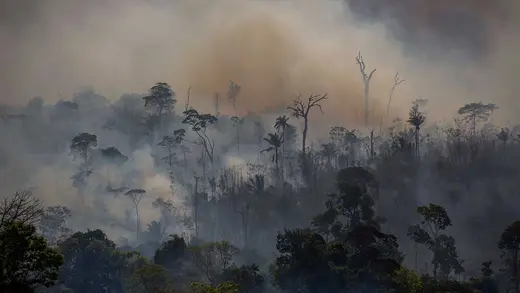How Brazil’s Burning Amazon Threatens the Climate
Fires in the Amazon have aroused international concern because of the rain forest’s outsize impact on climate, but political tensions are hampering the response.
By experts and staff
- Published
By
- Amelia CheathamEditorial Assistant/ Special Assistant
Fires in the world’s largest rain forest have triggered global worries, with environmental watchdogs blaming President Jair Bolsonaro’s government for encouraging deforestation. But Bolsonaro has downplayed the crisis and accused some countries offering aid of infringing on Brazil’s sovereignty.
What’s Happening
Brazil’s Amazon region has seen more than 60,500 fires since January, double the number reported in the same period last year. The states of Roraima, Acre, Rondonia, and Amazonas have been particularly hard-hit, and smoke from the blazes has caused midday blackouts two thousand miles away in Sao Paulo.
Fires are not unexpected during Brazil’s dry season, but the number and intensity of this year’s blazes, combined with Bolsonaro’s response, have focused attention on the rain forest’s important role in regulating rainfall and climate.
The Greenhouse Effect
These fires signal widespread degradation of the rain forest. Historically, the Amazon’s wet, tropical conditions made it practically fireproof. Now, scientists say, increasing temperatures and commercial activity are drying it out. Since Bolsonaro’s January inauguration, the rate of deforestation is up 39 percent compared to the same period in 2018, with 1,330 square miles of rain forest destroyed. Experts link this year’s fires to land clearing by farmers and loggers.
Development and subsequent fires weaken the Amazon, which plays a critical role in slowing climate change. Its vegetation absorbs about 600 million metric tons of carbon dioxide annually, and the 2015 Paris Agreement targets likely can’t be reached without it. Amazon fires have produced 228 million metric tons of carbon dioxide this year, the most since 2010, contributing to greenhouse gas emissions and offsetting the rain forest’s value as a carbon sink.
The Amazon’s wildlife, which makes up 10 percent of the world’s plant and animal species, is also under threat. Many animals are ill adapted to survive large-scale fires, and scientists warn that the blazes could kill off species “without [humans] ever knowing they were there.”

Brazil’s Response
Brazil has deployed soldiers to fight the fires, but Bolsonaro has largely played down the threat. He has lashed out at concerned watchdogs and world leaders, suggesting at one point that nongovernmental organizations set the fires in retaliation for government funding cuts. But Bolsonaro’s pro-development policies and rhetoric have spurred deforestation and encouraged businesses to clear the Amazon with impunity, critics say.
As international pressure has grown, Bolsonaro has sent mixed signals. He says Brazil lacks the resources needed to extinguish the fires. However, he has rebuffed foreign assistance as an attack on Brazil’s sovereignty. When French President Emmanuel Macron tweeted “our house is burning” last week, Bolsonaro accused him of having a “colonialist mind-set.” The two leaders continued trading insults, including during the annual Group of Seven (G7) summit, hosted this year by Macron.
This week, the Brazilian president spurned $20 million in G7 aid; he then agreed to negotiations if Macron were to retract his comments critical of Bolsonaro. Brazil has accepted planes from Chile and $12.2 million from the United Kingdom to boost its firefighting capacity.
Signal Fires
It remains unclear whether Bolsonaro will accept the G7 aid package. Countries that share the Amazon will meet next week to coordinate a response—some, including Bolivia, are dealing with their own large fires—and the crisis is likely to feature at next month’s UN General Assembly, where a summit on climate issues is already scheduled.
The Amazon fires are part of a spate of blazes around the world worrying scientists. Lesser-known fires in Central Africa are threatening the planet’s second-largest rain forest, the Congo Basin, and heavily forested areas in eastern Siberia are burning. Higher temperatures are partly to blame, and experts warn that further destruction of the world’s rain forests will hasten climate change.